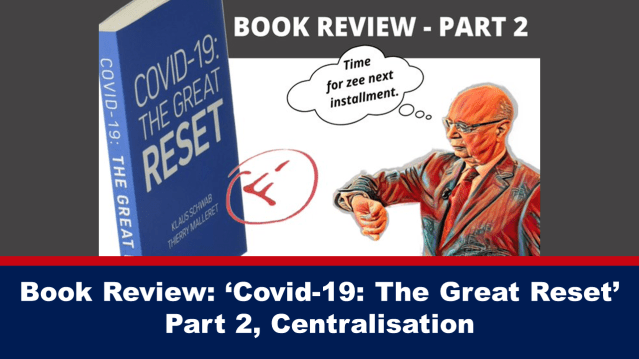Book Review: ‘Covid-19: The Great Reset’ (Part 2, Centralisation)
Klaus & Co. have sold 250,000+ copies of this book. It would shock me if 250+ people have actually finished it, tweeted Critical Sway. “I’m one of those people and frankly, I can understand if you don’t want to be next. [So] let me help.”
Three key themes emerge from the book:
- Pandemic Severity – of the virus, the control measures, the economic fallout
- Centralisation – World governance, coordination, public-private partnerships
- Societal Shifts – Human behaviour, equality, ESG
We’ll tackle one at a time. This will be a big job. So, I’m splitting it up:
Below is Critical Sway’s Twitter thread.
Chapter 2 – Centralisation
Klaus & Co. are back with their campaign for:
- → Centralisation
- → Global Governance
- → Public-Private Partnerships
Can they make a case? Let’s find out…
COVID-19: The Great Reset by Klaus Schwab & Thierry Mallaret.
It’s not a conspiracy theory. It’s a book.
- → Klaus is founder & exec. chair of the WEF
- → Nobody’s ever heard of Mallaret, but he’s from the WEF too
Chapter 1 – Pandemic Severity (in case you missed it, “ICYMI”) HERE.
Chapter 2 (right here & now) is all about centralisation. Following are some ideas from Klaus & Co. that focus on:
- → Increasing the role of government
- → Centralising decision making
- → Interfering with markets
You will probably be able to sense my disdain.
If you read the first instalment of the series, you already know Klaus & Co. don’t set the bar all that high. In any case, this rare and brilliant insight will give you a feel for the tone…
Apparently, everything is connected to everything else.
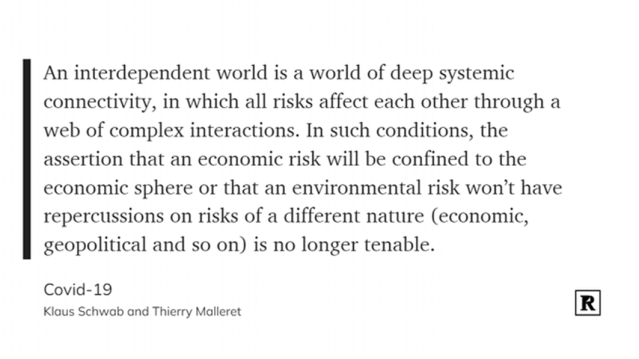
Then this one… (stay with me a moment, I’m building up to a point here).
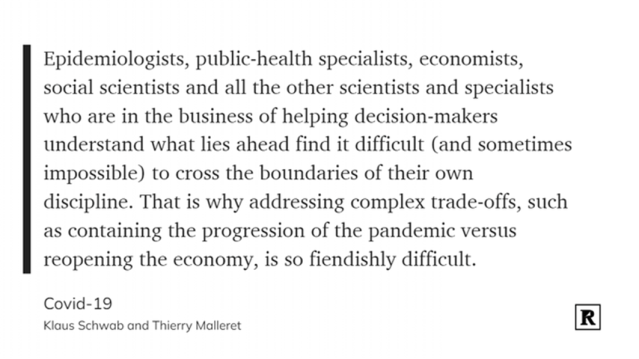
Ok, I agree with Klaus & Co. on some things:
- → We have complex interactions to consider
- → Those interactions cut across various spheres of expertise
- → Experts find it difficult or impossible to work outside of their own disciplines
So, what are we to make of this???
I would describe that as a conclusive list of reasons NOT to centralise decision-making. Klaus & Co. see it as a great opportunity TO centralise decision-making. Just like the aftermath of WW2:
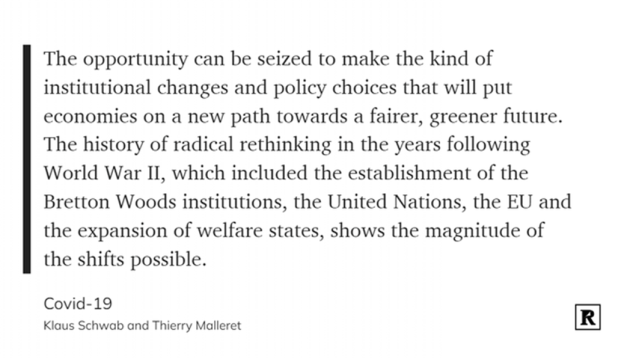
1. The inference here is that the aftermath of Covid-19 is similar to the aftermath of WW2. QUICK STATS…
- COVID-19 → 6.5 million deaths*
- WW2 → 40 to 50 million deaths
*Without discussing “died of” vs “died with”.
2. Entire books have been written about the institutions Klaus & Co. chose to mention as examples. I’ll ask you this: How well are those institutions doing vs their original purpose?
- Bretton Woods → Economic Stability
- The UN → World Peace
- The EU → Peace & Prosperity
Klaus & Co. move on to tell us about the future role of government in society:
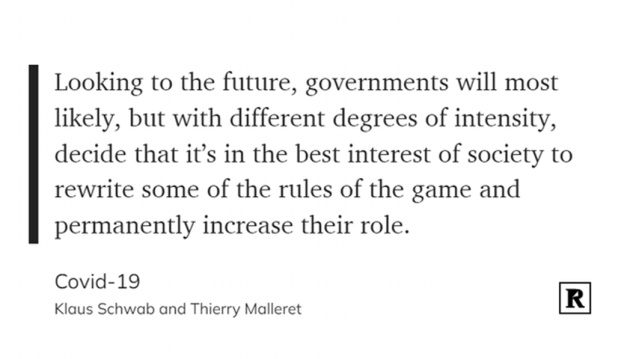
Look, I’m a free market, libertarian-leaning kind of guy. Klaus and I were never going to see eye-to-eye on this. For the record, I think increasing the role of government is a terrible idea that might be in the interests of a select few people, but not the rest of us.
Next, we read about private companies becoming more involved in the mitigation of global risks. Or, said another way – governments becoming more involved in the affairs of private, profit-making enterprises. What could go wrong?
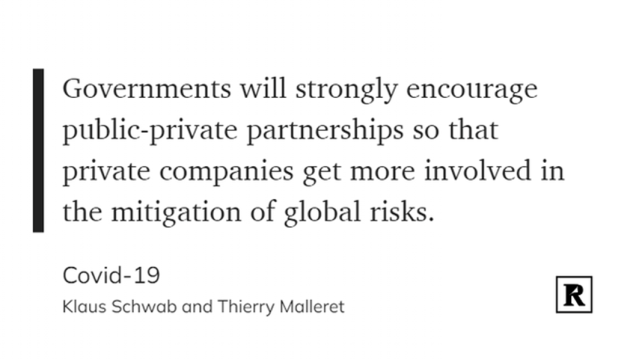
Klaus & Co. say that the WTO and WHO are underfunded. I say underfunded is not as good as defunded, but you have to start somewhere.
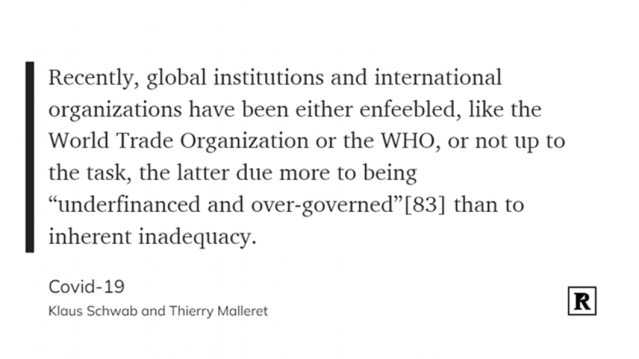
Oh, BTW…
The WHO budget for the 2022/2023 biennium is $6.72 billion. Whether that could reasonably be described as “underfunded” is a subjective judgement, I suppose. You can guess my opinion on the matter.
Of course, you can’t talk about the WHO without talking about Bill Gates…
I’m not sure why Klaus & Co. find this comment from Bill “compelling”. Apart from the fact that he said it. And I mean, he’s kind of invested… he would say this, wouldn’t he?
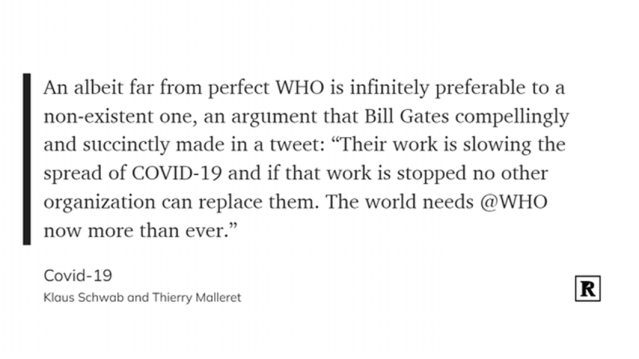
Guess what else Klaus & Co. predict will become the subject of centralised, top-down control? → Minimum wages. Via increased regulation.
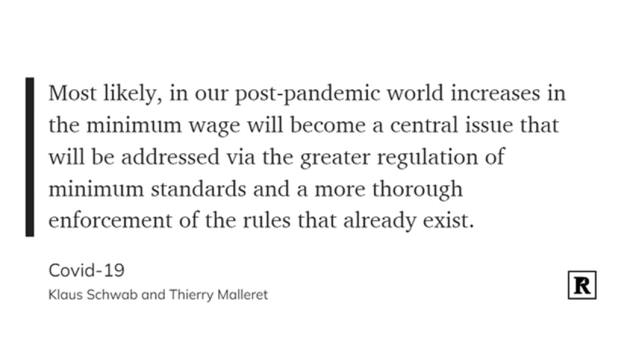
I predict that would be a net negative. I’m not going to try and explain why in a tweet. Richard Ebeling, via the Mises Institute, does a far better job of it than I could anyway:
One final contradiction – just in case Klaus & Co. haven’t done enough of that yet…
We went from this:
“The shock that the pandemic has inflicted on the global economy has been MORE SEVERE and has occurred MUCH FASTER than ANYTHING ELSE in RECORDED HISTORY.”
To this:
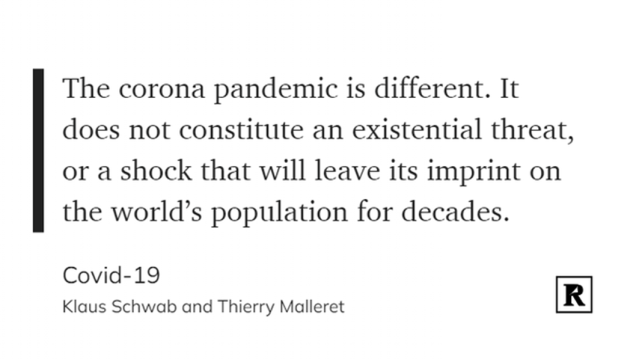
And finally… If there is ANY doubt left in your mind that Klaus Schwab thinks we should have global governance… This quote should settle it:
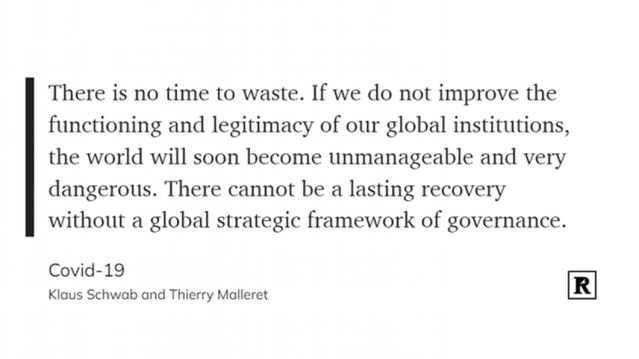
Klaus & Co. clearly like the idea of centralised powers who can rule over the world.
I don’t.
Excessive concentration of power is a recipe for disaster, no matter who wields it. Eventually, someone with genuinely evil intent seizes control. That is inevitable. And, in 2022, it might have already happened.
Thanks for reading and I hope you’ll be back to check out the final instalment. Chapter 3 is all about the societal changes foretold by Klaus & Co.
P.S. There’s always the chance that I’ll push my luck too far and get shut down one day. If you want to make certain we stay in touch, you can sign up for my newsletter with this LINK. No spam, I promise.
You can find Critical Sway’s full Twitter thread on ThreadReader App HERE or, in the event it is removed from Twitter, in the copy attached below.
